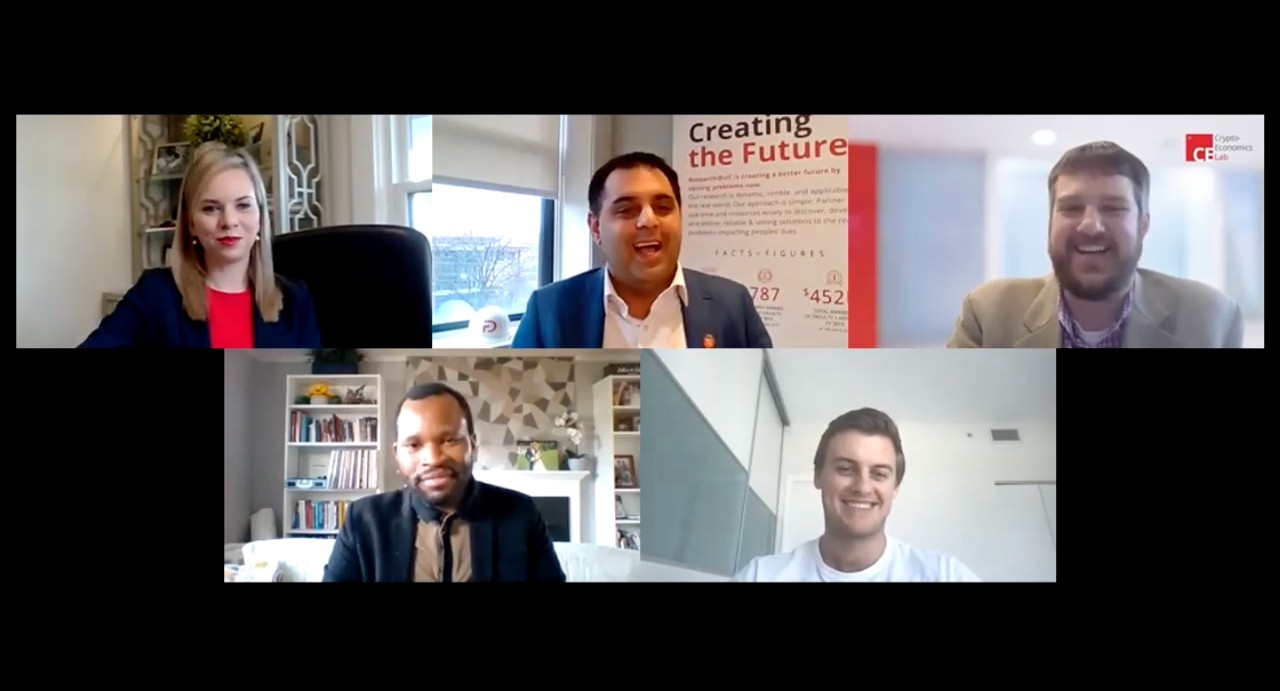
Cryptocurrency helps nonprofits connect to new donors
Flashpoint Series discussion explores growing source of philanthropy
Cryptocurrency is a fast-growing source of donations and helps nonprofits connect with a new demographic of donors, experts said Feb. 17 during a panel discussion hosted by the University of Cincinnati, called Digital Futures Flashpoint Series.
The discussion — “Is Cryptocurrency the Future of Philanthropy?” — explored how nonprofits including the United Way and Northern Cincinnati Foundation have expanded their fundraising by accepting cryptocurrency donations.
“People who have crypto [capabilities] are usually all-in. This is really their preferred way to give,” said Alex Wilson, co-founder of The Giving Block, an organization that helps nonprofits with cryptocurrency fundraising. “And these are usually new donors. They weren’t mailing a check every month before. These are people who are only donating because you accept crypto, and if you aren’t on the menu for taking crypto, they’re probably going to go somewhere else.”
Though it’s a quickly growing field, as evidenced by the numerous cryptocurrency commercials during the 2022 Super Bowl and The Giving Block reporting a 583% increase in donations in 2021, cryptocurrency remains mysterious to much of society.
Michael Jones, the Kautz-Uible Professor of Economics in UC’s Carl H. Lindner College of Business, is seeking to help people better understand this emerging market, explore the best ways to invest digital assets and solve issues such as cryptocurrencies’ high energy usage.
“We’re going to explore solutions of how we can get those energy costs down,” he said. “We’ve already started to reach out to partners, other corporate sponsors, people that can help us think about these issues.”

Clockwise from top left, Erin Clemons, president and CEO, Northern Cincinnati Foundation; Jai Chabria, former senior adviser to Ohio Gov. John Kasich and current managing director at Mercury, a global strategy firm; Michael Jones, the Kautz-Uible Professor of Economics in the University of Cincinnati’s Carl H. Lindner College of Business; Alex Wilson, co-founder, The Giving Block; and Edwin Goutier, vice president of innovation, United Way; discuss the future of cryptocurrency and philanthropy during the Digital Futures Flashpoint Series. Photo/Digital Futures.
There are thousands of cryptocurrencies, approximately 70 of which The Giving Block accepts on behalf of its nonprofit clients. More than 300 million people worldwide use cryptocurrency with trillions of dollars invested in the digital currencies.
“At the end of the day, money is trust,” Jones said. “People asked, ‘Is this real?’ Well, it’s real if somebody is going to give me something from Amazon and if they accept Bitcoin in exchange. Anytime something is used as a medium of exchange, that’s real.”
While more businesses are starting to accept cryptocurrencies including Bitcoin and Ethereum, they’re not as widely accepted as other forms of payment such as cash or credit cards. But the most prominent cryptocurrencies can be converted to cash.
The Giving Block allows its clients to immediately convert cryptocurrency donations into cash, a tool both the United Way and Northern Cincinnati Foundation use.
“To me it’s no different than donating appreciated stock, and it’s even easier than donating appreciated stock,” said Erin Clemons, president and CEO of the Northern Cincinnati Foundation.
The Northern Cincinnati Foundation started accepting cryptocurrency when a 26-year-old man sought to make a donation.
“He reached out to many other community foundations in the region,” Clemons said. “We were the community foundation that was willing to change, bring on The Giving Block to help facilitate the donation, and it was just a win-win.
“It’s done a lot in the visibility space and marketing space for the Northern Cincinnati Foundation.”
These are people who are only donating because you accept crypto, and if you aren’t on the menu for taking crypto, they’re probably going to go somewhere else.
Alex Wilson Co-founder of The Giving Block
The United Way started accepting cryptocurrency donations in 2014 as a way to reach a new group of donors.
“We saw that there was this growing passionate group of people who had wealth and wanted to have an outlet to do good with the wealth that they were coming into,” said Edwin Goutier, vice president of innovation for United Way Worldwide.
Analytics from unitedway.org show the website’s average user is 45 to 65 years old and 80% are female.
Meanwhile, visitors to unitedway.org/bitcoin, the United Way’s cryptocurrency donation site, are on average 25 to 35 years old and 80% are male. The cryptocurrency donors also tend to be very interested in finance and technology.
“We know it’s a completely different group of people that are coming to us now and that we are able to tap into,” Goutier said.
Jai Chabria, former senior adviser to Ohio Gov. John Kasich and current managing director at Mercury, a global public strategy firm with 18 offices worldwide, moderated the discussion and cited a charitable study that found cryptocurrency investors are more generous to charities than the investor population as a whole.
That generosity combined with the tax benefits of donations, allowing investors to avoid capital gains taxes while receiving tax deductions, can help explain the rise in cryptocurrency donations.
“Depending on your tax bracket and things like that, you’re probably looking at a 20% to 30% difference in tax efficiency of donating crypto that’s appreciated versus donating with your credit card,” The Giving Block’s Wilson said.
Wilson also has seen a large increase in philanthropy with nonfungible tokens, also known as NFTs, which are digital assets such as artwork. A benefit of NFTs is that artists and nonprofits can earn royalties every time they’re sold, rather than with traditional art from which they only receive payment from the original sale.
“Last year was really when we saw what we call NFT philanthropy take off,” Wilson said. “We saw somewhere between $12 million and $13 million donated that came from artists selling NFTs and donating the proceeds.”
Anytime something is used as a medium of exchange, that’s real.
Michael Jones Kautz-Uible Professor of Economics in UC’s Carl H. Lindner College of Business
UC’s Jones and his students are aiming to better understand cryptocurrencies and NFTs through their research and providing education to organizations including nonprofits, corporations and government entities.
“We get all the right people in the right place, and the magic can happen,” Jones said. “And not just the university benefits but you can see the community really benefit from that as well.”
The Digital Futures Flashpoint Series, a series of “conversations of consequence,” is in its second year. The series aims to bring together experts, from UC and beyond, to talk about topics including the heroin epidemic, water quality on the Ohio River and cybersecurity in elections.
Six stories tall and 180,000-square-feet, UC’s new Digital Futures building will be the first facility for interdisciplinary research in UC’s more than 200-year history when it celebrates its grand opening in September 2022.
“Digital Futures will house some of UC’s top talent working at the intersection of imagination and innovation,” said Jennifer Krivickas, UC’s associate vice president for research. “Not bound to any one college or discipline, the Digital Futures research program is intentionally inclusive, intellectually diverse and will allow UC researchers to partner and more directly act on its impetus to both serve the public good locally and have an impact globally.”
Featured image at top courtesy of Unsplash.
Next Lives Here
The University of Cincinnati is classified as a Research 1 institution by the Carnegie Commission and is ranked in the National Science Foundation's Top-35 public research universities. UC's undergraduate, graduate and medical students and faculty investigate problems and innovate solutions with real-world impact. Next Lives Here.
Related Stories
Cincinnati a top destination for street art, museums
February 27, 2026
Discover why Cincinnati is a top destination for street art and museums, ranked among USA Today’s 10Best for 2026. Explore how University of Cincinnati research shows public art boosts community vitality, and find the best things to do near UC’s campus for students and visitors alike.
Intrapreneurship: Strategies to promote internal innovation
February 27, 2026
Intrapreneurship encourages employees at large companies to innovate and test ideas with an entrepreneur’s level of freedom. Learn how to become an intrapreneur in your organization.
'Paradigm-shifting' study confirms effectiveness of long-acting HIV treatment
February 26, 2026
The results of a clinical trial involving the University of Cincinnati, recently published in The New England Journal of Medicine, show people failing HIV treatments with oral medications were able to be treated successfully using injections.
